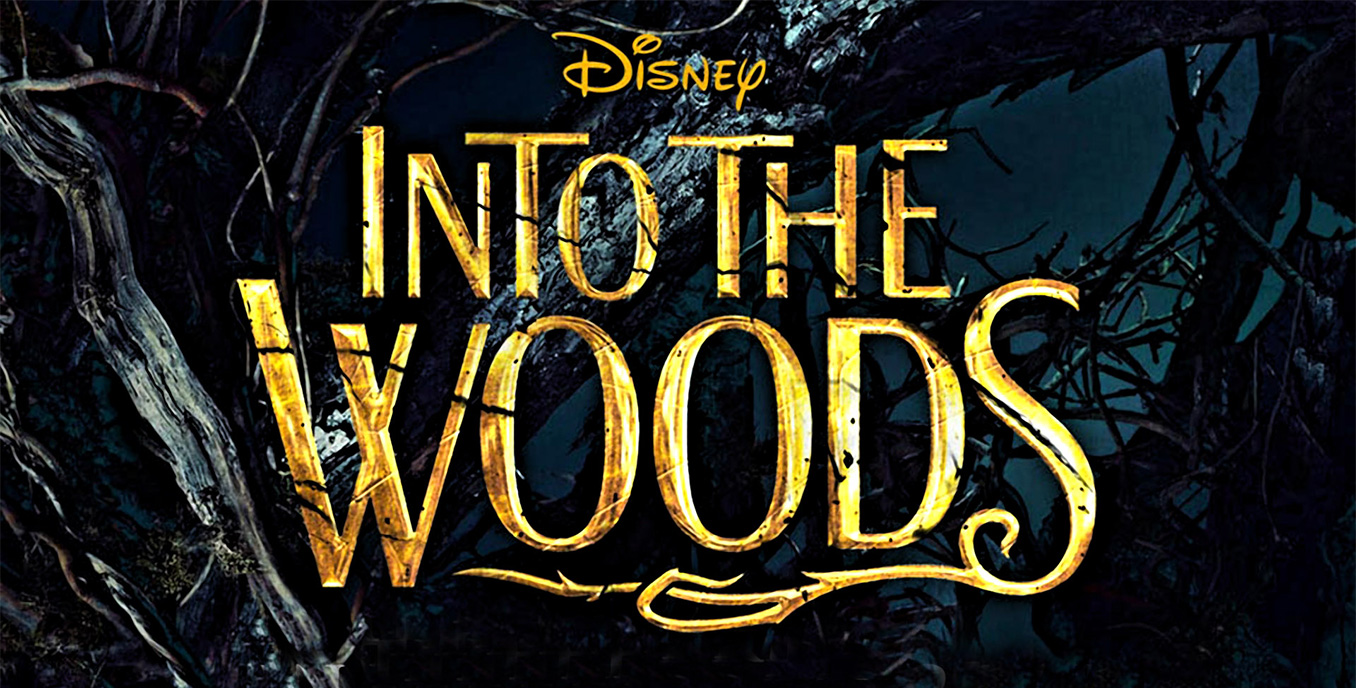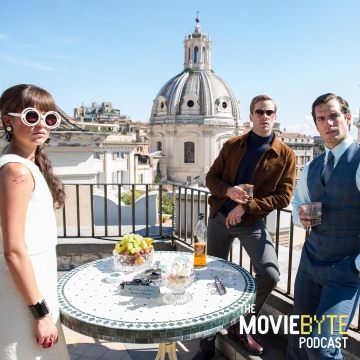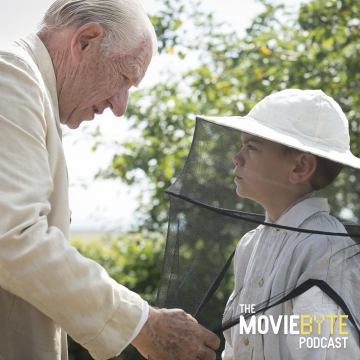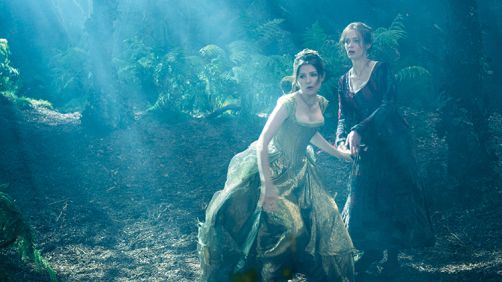
Into the Woods is based on the award winning Broadway musical of the same name. The play is much celebrated and many love it, but it is by no means for children. It deals with very adult themes and content. As such, one wonders what Disney’s interest in the film is/was? Disney is not beyond making more adult content, but it’s almost always of a type that children can still watch and enjoy as well. Though I believe it was Disney’s intent to put this film in that later category, I certainly don’t think I would take any of my children (8, 6, 4, and 2) to see it — and therein lies one of the big problems. There are more problems than just this one, but this is probably the biggest one in my opinion: this film has audience confusion. Who’s this film for? Who is the target audience? Who should see it? You see, on the one hand, you’ve got these familiar fairytale stories and characters wrapped up in the story, and we’ve constantly had the dumbed down version of these tales from Disney — the “childrenified” stories such as Disney’s Cinderella where nobody’s feet get mauled and no birds pluck out step-sister’s eyes. On the other hand, you’ve got these themes of wishing, wanting, betrayal, sexuality, and more.
Disney’s Interest
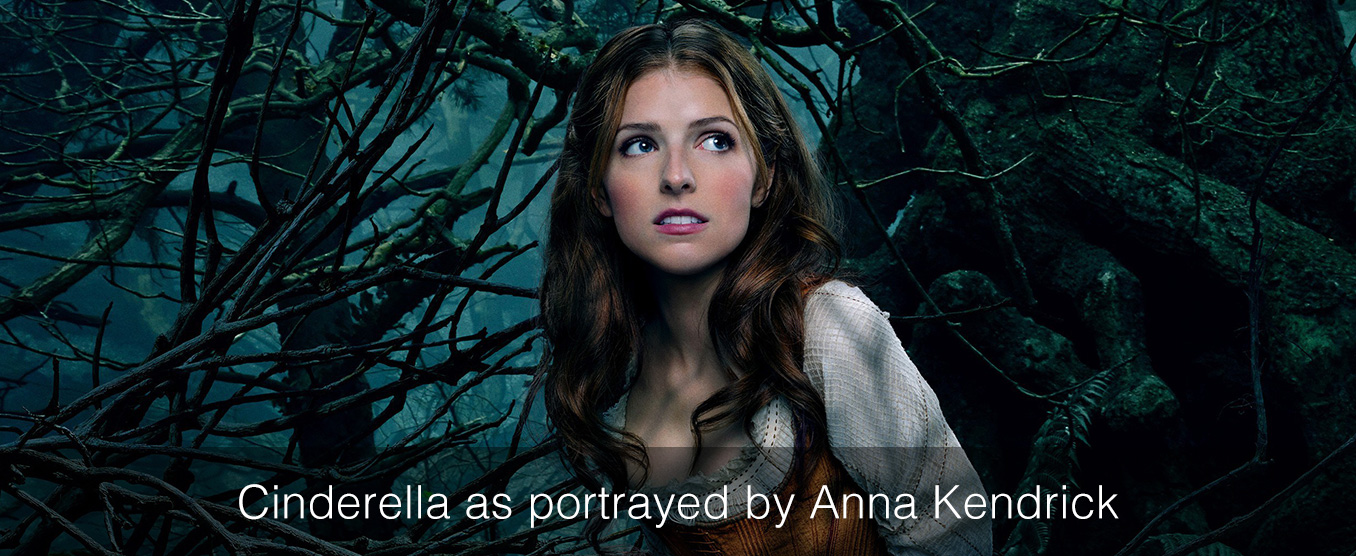
It’s actually pretty easy to see what Disney’s interest in this is. Disney has told the story of all the characters in the film in some form or fashion. Why not bring them all together? The thing is, these are not the Disney-ized versions of these characters. They stick much closer to the original stories of the Brothers Grimm and as such, they are darker — and potentially have more meaning.
For instance, Cinderella goes to the three day ball each of the three nights, and runs away with the prince wishing he could find her and catch her each night. As in the Grimm story, the third night, the prince spreads the stairway by which she escapes with pitch. When the prince gets one of her golden slippers left in the pitch, he seeks the young lady who fits the slipper. As in the Grimm version of the story, the evils step-sisters mutilate and cut off parts of their feet to fit the slipper, but the prince is not fooled (though in the Grimm version, he is fooled and alerted to the problem by doves). Finally he finds Cinderella, who’s feet obviously fit in the shoes. As in the Grimm story, the evil-stepsister’s eyes are plucked out by birds, and Cinderella and the prince live happily ever after… or do they?
I have chosen to show the difference between the Disney story of Cinderella and the one here in Into the Woods because perhaps it is the most stark, but you get the idea. These are not the fairy tales you likely grew up with. And they are certainly quite a bit more dark and gruesome.
Cast
The film is chalk full of talent. Some new faces and some faces we all recognize. I’ll go over the highlights:
Anna Kendrick - Her turn here as Cinderella is quite good. Obviously she’s good with the singing (and this is a musical so that’s important), being a key member of the Pitch Perfect cast (check out her voice in Pitch Perfect’s Cups). And she’s not a bad actress — although I would describe her performance here as just a tad saccharin. Not terribly annoying, but just a wee little bit. Some of that is, of course, because of the character she’s playing.
Daniel Huttlestone - This is our giant slayer, Jack. His story is probably the least fleshed out and often happens off screen. The young actor is good — you might remember him as the street urchin from 2012’s Les Mis. I admit I’m a sucker for British accents, and his Cockney accent is pretty delightful.
James Corden - This is a new actor for me, and unfortunately I found his performance to be the least believable. He’s the baker who’s wife is barren and the driving force of the story. As a primary character, I found my lack of connection to his performance unfortunate since he is seen the most often onscreen. He did not seem to be in earnest many times, and often stumbled through his line readings with very little feeling. Much of the film hangs on this performance and I was not impressed.
Emily Blunt - When has Emily Blunt ever appeared in anything and not been good? Such is the case, again, here. And she can sing — who would have known? She has a particularly poignant role in the play’s narrative as the baker’s wife. I will say though, that while Blunt did well in the role, I was sometimes not sure what to make of the character. More on that later.
Lilla Crawford - Our Little Red Riding Hood is a newcomer to film acting, and she shined here in this role. Her earnestness was a bit over-the-top but it’s an over-the-top fairytale so I’ll reserve judgement on that until I see her again in another role. As it is, it worked well for this film. She’s just 13, but I think she has the potential to go places in the acting world.
Meryl Streep - Our (wicked?) witch. She wants what she wants, and she locked up Rapunzel in a tower. In the end, I suppose she got what was coming to her, though I ended up wanting more subtlety.
Johnny Depp - As always, he’s weird. That’s good because the role he’s playing is weird. With origins as a stage play, this is quite a big nod to the theatricality of that stage play. Depp is a wolf, but he’s wearing a “wolf coat” with a tail and a twirlly mustache. Did I also mention he was weird? There is a scene where Riding Hood and Grandmother are rescued by the baker from having just been eaten by the wolf. The baker uses a knife, and when the wolf is “cut open” and it’s very “stage play” like. The “stomach” they are in is made of silk, and we see the baker cutting in from the inside perspective of Riding Hood, and he’s cutting through cloth. This entire bit feels like we’re on a stage watching a play.
Mackenzie Mauzy - This is our Rapunzel. She doesn’t have a huge role to play here, but she’s worth a mention because I enjoyed the character whenever she was onscreen. But her character is mostly a foil for others.
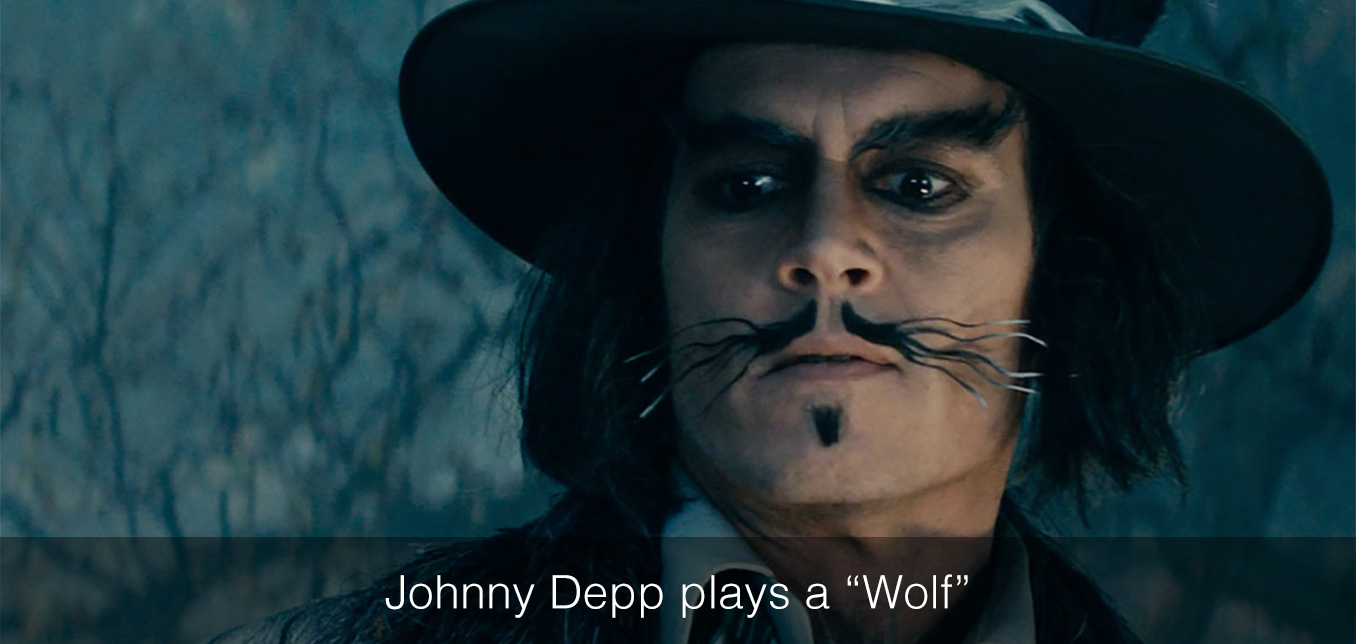
A Stage Play And its Morals Onscreen
The last film I saw based on a stage play was Les Mis (2012). In the case of that film, it felt very much more like a film production even if you could see the stage play roots. This film, by contrast, screams stage play at every turn. But I found it charming for the most part (in fact I would say where this film strays is when it feels less like a theatrical stage production). As anyone who knows me well can attest, I like very few musicals. However, in the first act of this film I was sold. It never felt (all that) cheesy or over the top, and the lyrics were often meaningful and full of life, not stilted.
The big theme and the recurring lyric in this musical stage play is simply this: “I wish…” Everyone wishes for something other than the plight that they have. Everyone wants something else, something better. This is the human condition, is it not? We all want things that we cannot, or maybe should not have. Or sometimes, we want things we think are better that there’s nothing inherently wrong with, but maybe they just wouldn’t be good enough. Worse yet, maybe no matter what we have we just wouldn’t be happy. This is the prevailing theme of the film — be careful what you wish for, you may get it and you will probably not be happy with it. When the grass looks greener on the other side, it never is.
I found this theme to resonate because I have often experience this in life, as I am sure all of you have. I wanted the better car, the better computer, the next iPhone, a better sound system, bigger monitors. There’s nothing wrong with any of these things, but we must learn to be content also with what we have.
Flawed Adaptation
Unfortunately, like many films, this one is not without its flaws. More unfortunately, there were more flaws than I was hoping for. I’ve already mentioned some of them, such as the target audience problem, and a slight (very slight) annoyance with Anna Kendrick’s performance being a bit syrupy. And of course James Corden being a bit of a let down.
But there are a couple other big things I want to bring to light here.
No Resolution For The Baker’s Wife
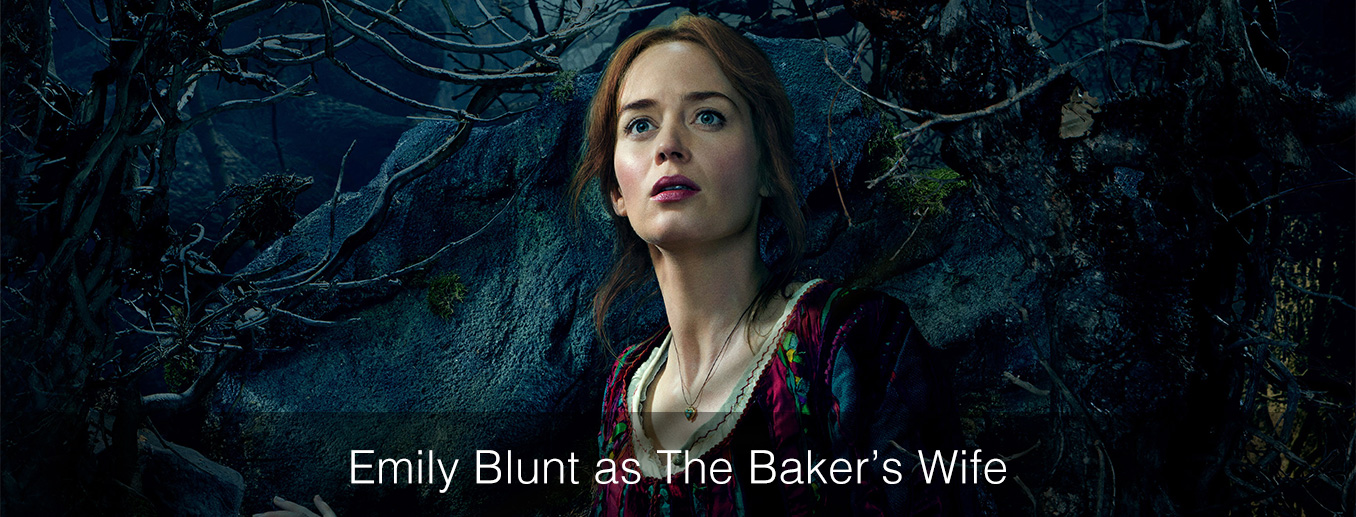
I was on board with where the story was going with the themes of wishing and wanting — and this theme was most clearly seen with The Baker’s wife and Cinderella’s prince. When these two happen upon each other in the woods, they find their previous fulfilled wishes were not enough and they wish for each other. And they pursue each other. The Baker’s wife’s conscience bothers her just a bit, but the charming prince pursues and persuades and they end up in the throes of passion. It is a bit unclear in the film whether they went all the way, although — while I have never seen the stage play, I am given to understand that the intent of the story is that the two pursued a one night stand adulterous relationship. You can certainly read that into the film and I took it as such. This is all fine in pursuing the teaching of the moral tale we’ve been talking about.
The Baker’s wife does then sing a song wondering if she should be remorseful.
[SPOILERS FOLLOW]
She is then promptly killed and it is not clear if she was every remorseful or sorrowful of her unfaithfulness or whether she persisted in her folly and delusion. Either way, I felt that her story was unconcluded and that her death was abrupt and sudden.
The Appearance of the Baker’s Father
Another aspect of this film that felt abrupt and weird was the appearance of the baker’s father from beyond the grave to speak with the baker and give him life advice. This happened near the very end of the film and came at a crucial moment in the Baker’s development. In the stage play, it happened throughout the story, but in this adaptation, it only happened just this once and felt abrupt and strange. They should have stuck with the concept from the original story where it was a recurring thing and I think it would have worked much better.
Is this a stage play, or a CGI extravaganza?
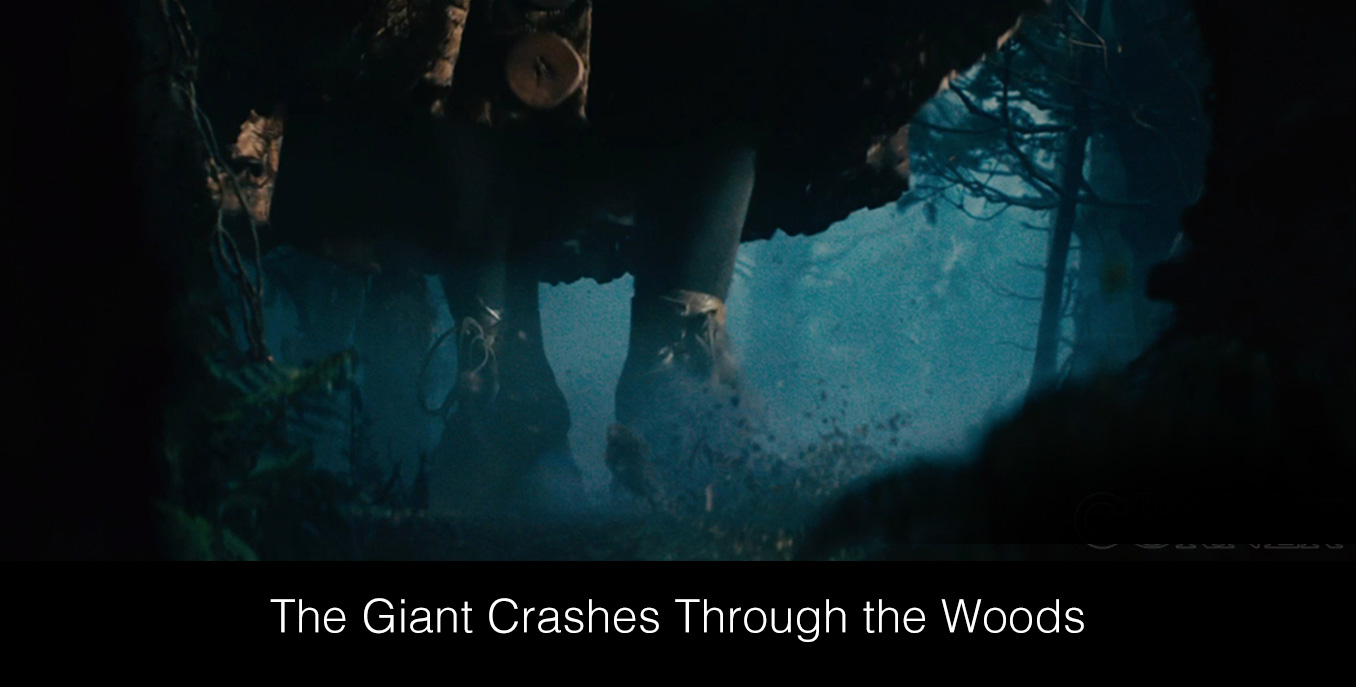
The confusion of this movie’s identity, unfortunately, does not end with the question of who the audience is. The film also does not know if it wants to stick to its stage play roots, or be more of a special effects CGI big budget film. In the first half (or maybe more) of the film, it felt very grounded and stage play-like. I mentioned the scene where the Baker cuts Riding hood and her grandmother out of a “silk stomach”. To be honest, I really liked this. In a world where we get nothing but CGI special effects extravaganzas, it was refreshing and honest. It told me the film was about the story and sticking to it’s roots and grounded-ness more than anything else.
But then we got big CGI beanstalks and a big freaking giant smashing things up. I found two problems with all this CGI mess in the conclusion of the film.
- It felt incongruous with the earlier parts of the film. Where they had worked so hard to give it a stage play feel, now suddenly it feels like a different film entirely.
- The effects did not seem very well done — particularly the scenes with the giant felt cheap and under-welming. If they had to go there, why not do it right? But it felt like the budget of the film just couldn’t support what they were trying to do.
I wish Director Rob Marshall Would have just stuck to the stage play feel.
Where is the Directorial Distinctiveness?
I had this complaint about Unbroken as well if you listened to that episode of the podcast, so at the risk of repeating myself or sounding like a broken record, I again felt that here. This film did not seem to have a distinctive flavor or feel to it. I could not detect any stamp of creativity added to this story. It was simply rendered to the screen. Sure there are small things that are nice touches, but no over-arching vision. Maybe I’m just missing something here.
In Conclusion
So what is my summary thought on this film? It’s one you should probably see. It has some good messages and themes, and much of the film is delightful even if it misses the boat a little — particularly toward the end. But I think this will be a film we’ll all want to come back to now and then and revel in the glory of a big budget stage play, at least in the earlier parts of the film. There’s also something delightful about much of the music — and that is a rare thing for me to say about a musical indeed.
